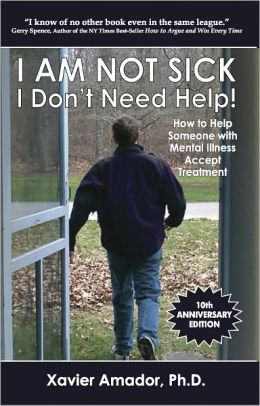It can be frustrating to try and convince a teen with a serious mental illness to accept treatment. Some teens find the idea of taking medicine unnatural and some hope that the symptoms will go away without medicine. Often, the teen is unconvinced that he or she is sick. Forty percent of individuals with bipolar disorder and sixty percent of individuals with schizophrenia have an accompanying symptom called anosognosia. It means that they do not recognize that they are ill. It looks like denial, but it is actually a part of the disease.This can be extremely disheartening and frustrating for a parent because it greatly impairs treatment. Not surprisingly, family members often focus on trying to convince their relative that they have the illness, which only makes the patient feel misunderstood.
Fortunately, being on medicine removes this symptom. But how to get there? You can work around your teen’s disbelief, using a strategy described in the excellent book, I am Not Sick I Don’t Need Help, by Dr. Xavier Amador. This book has helped many families with recalcitrant loved ones, using a method called LEAP. I summarize Dr. Amador’s LEAP method below:
L is for listen: Listen to your teen’s concerns about medicine. Don’t interrupt, but feel free to ask for clarification if you think you are misunderstanding them. Don’t argue or try to dispute what they say.
E is for empathize: Forget about your own frustrations and fears for the moment and let your teen know that you understand how they feel. Offer sympathy for what they are going through.
A is for agree: Try to agree upon something, even if it’s something as simple as the fact that your teen is depressed and wants to feel better.
P is for partner: Tell your teen you want to help them achieve their goal. If they don’t want to take medicine, what will they agree to do? If the two of you can agree to a plan—any plan—at least you’re working together.
LEAP won’t give you the immediate outcome you’re looking for, but it’s a start. It’s also an improvement over arguing. Sometimes a first step leads to another. The book explains the steps in detail and will give you ideas for how to be effective with each one. It has helped many families get their loved ones into treatment.

 “Summer vacations can wreck havoc with a teen’s mood, but you can help your teen continue to improve mentally by providing goals and activities for the summer.”
“Summer vacations can wreck havoc with a teen’s mood, but you can help your teen continue to improve mentally by providing goals and activities for the summer.”